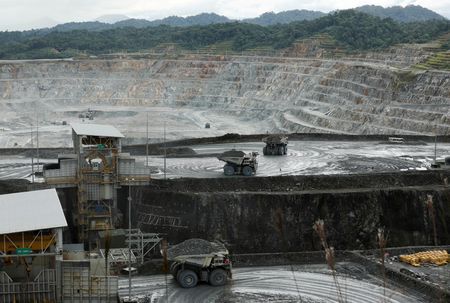 1
1 1
1

By Valentine Hilaire
PANAMA CITY (Reuters) -Canada-based miner First Quantum would suspend a “significant amount” of jobs at its operations in Panama if the Central American government forces it to halt operations during a contract dispute, the company said in a letter.
“If we have to reduce operations to care and maintenance mode, the company will need to take steps to reduce expenditure across the business. We could be forced to suspend a significant amount of our valued workforce,” the letter sent to employees and seen by Reuters said.
The company’s Cobre Panama mine generates about 40,000 direct and indirect jobs and interacts with some 1,800 suppliers, according to a consultant.
First Quantum was notified on Dec. 21 of a government order for it to create a plan to halt operations within 10 working days, after it missed a deadline for a new contract due to disagreements centered on royalties and tax payments.
“This is a drastic and, in our view, unnecessary step, which will potentially have a huge impact on employees, our suppliers and the community around us,” said the letter, signed by General Manager Alan Delaney.
First Quantum is working on the plan, but expects to reach a deal with the government before the order is enacted, the letter said, adding that its next step will be issuing an appeal.
A spokesperson for the government did not reply to a request for comment on the timetable for the order. The Canada-based miner did not immediately reply to a request for comment.
The two parties have been at odds for more than a year over payments to the government, contract stability and the area of the company’s operations. The government has pushed to raise annual royalties to $375 million.
First Quantum is prepared to meet and even exceed $375 million in royalties per year with downside protections, the letter said, though it did not outline the remaining hurdles preventing the two parties from reaching a contract.
(Reporting by Valentine HilaireEditing by Bill Berkrot)